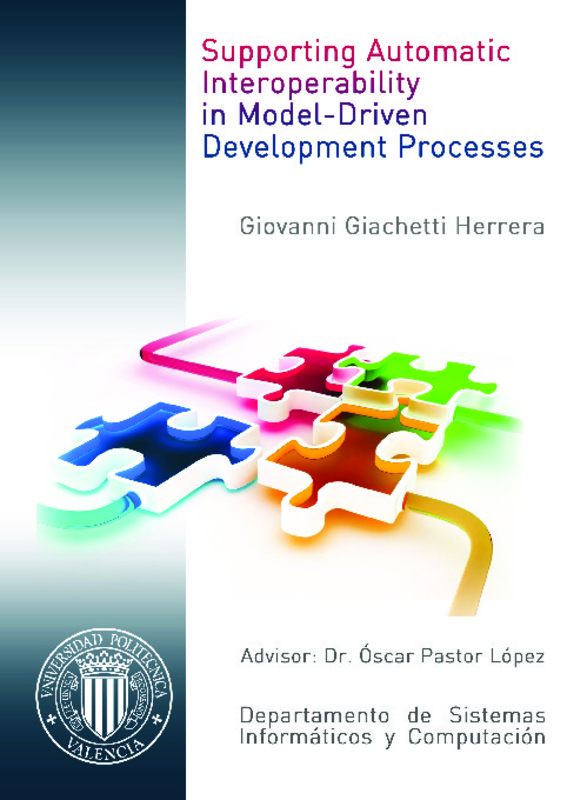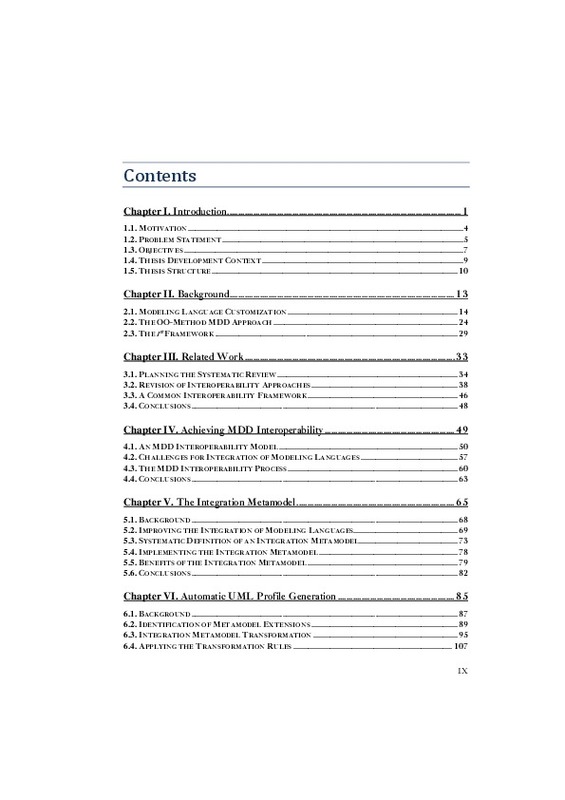- RiuNet repositorio UPV
- :
- Investigación
- :
- Tesis doctorales
- :
- Ver ítem
JavaScript is disabled for your browser. Some features of this site may not work without it.
Buscar en RiuNet
Listar
Mi cuenta
Estadísticas
Ayuda RiuNet
Admin. UPV
Supporting Automatic Interoperability in Model-Driven Development Processes
Mostrar el registro sencillo del ítem
Ficheros en el ítem
| dc.contributor.advisor | Pastor López, Oscar
|
es_ES |
| dc.contributor.author | Giachetti Herrera, Giovanni Andrés
|
es_ES |
| dc.date.accessioned | 2011-07-04T07:43:17Z | |
| dc.date.available | 2011-07-04T07:43:17Z | |
| dc.date.created | 2011-06-13T08:00:00Z | es_ES |
| dc.date.issued | 2011-07-04T07:42:58Z | es_ES |
| dc.identifier.uri | http://hdl.handle.net/10251/11108 | |
| dc.description.abstract | By analyzing the last years of software development evolution, it is possible to observe that the involved technologies are increasingly focused on the definition of models for the specification of the intended software products. This model-centric development schema is the main ingredient for the Model-Driven Development (MDD) paradigm. In general terms, the MDD approaches propose the automatic generation of software products by means of the transformation of the defined models into the final program code. This transformation process is also known as model compilation process. Thus, MDD is oriented to reduce (or even eliminate) the hand-made programming, which is an error-prone and time-consuming task. Hence, models become the main actors of the MDD processes: the models are the new programming code. In this context, the interoperability can be considered a natural trend for the future of model-driven technologies, where different modeling approaches, tools, and standards can be integrated and coordinated to reduce the implementation and learning time of MDD solutions as well as to improve the quality of the final software products. However, there is a lack of approaches that provide a suitable solution to support the interoperability in MDD processes. Moreover, the proposals that define an interoperability framework for MDD processes are still in a theoretical space and are not aligned with current standards, interoperability approaches, and technologies. Thus, the main objective of this doctoral thesis is to develop an approach to achieve the interoperability in MDD processes. This interoperability approach is based on current metamodeling standards, modeling language customization mechanisms, and model-to-model transformation technologies. To achieve this objective, novel approaches have been defined to improve the integration of modeling languages, to obtain a suitable interchange of modeling information, and to perform automatic interoperability verification. | es_ES |
| dc.language | Inglés | es_ES |
| dc.publisher | Universitat Politècnica de València | es_ES |
| dc.rights | Reserva de todos los derechos | es_ES |
| dc.source | Riunet | |
| dc.subject | Model-driven development | es_ES |
| dc.subject | Interoperability | es_ES |
| dc.subject | Modeling | es_ES |
| dc.subject | Metamodeling | es_ES |
| dc.subject | Uml profile | es_ES |
| dc.subject | I* framework | es_ES |
| dc.subject | Oo-method | es_ES |
| dc.subject | Integration | es_ES |
| dc.subject | Framework | es_ES |
| dc.subject.classification | LENGUAJES Y SISTEMAS INFORMATICOS | es_ES |
| dc.title | Supporting Automatic Interoperability in Model-Driven Development Processes | |
| dc.type | Tesis doctoral | es_ES |
| dc.identifier.doi | 10.4995/Thesis/10251/11108 | es_ES |
| dc.rights.accessRights | Abierto | es_ES |
| dc.contributor.affiliation | Universitat Politècnica de València. Departamento de Sistemas Informáticos y Computación - Departament de Sistemes Informàtics i Computació | es_ES |
| dc.description.bibliographicCitation | Giachetti Herrera, GA. (2011). Supporting Automatic Interoperability in Model-Driven Development Processes [Tesis doctoral]. Universitat Politècnica de València. https://doi.org/10.4995/Thesis/10251/11108 | es_ES |
| dc.description.accrualMethod | Palancia | es_ES |
| dc.type.version | info:eu-repo/semantics/acceptedVersion | es_ES |
| dc.relation.tesis | 3575 | es_ES |
Este ítem aparece en la(s) siguiente(s) colección(ones)
-
Tesis doctorales [5389]







![Text file [Text]](/themes/UPV/images/text.png)


